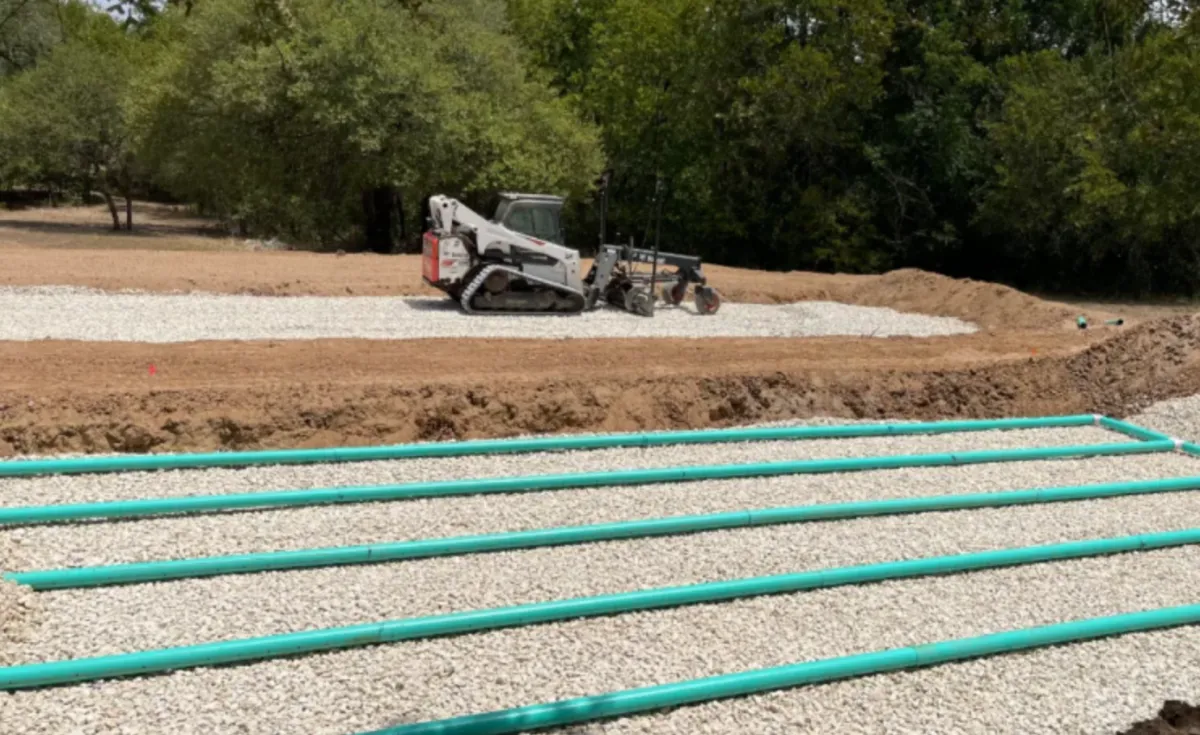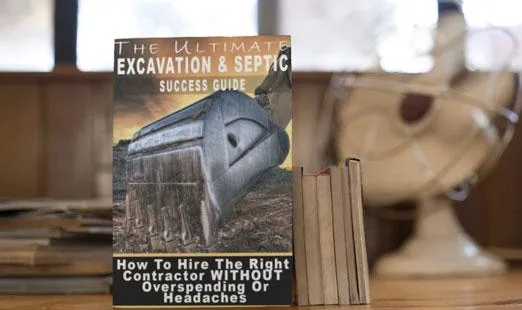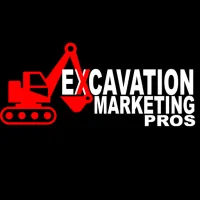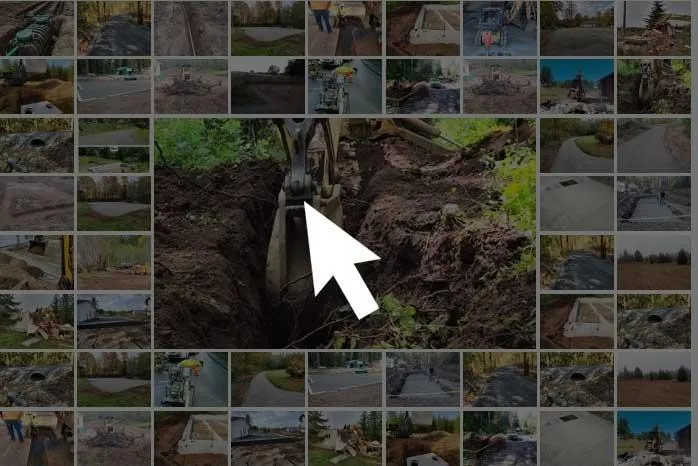The Royal Flush - Design, Install & Repair
Licensed, Bonded & Insured | Family Owned & Operated Since 1965
Licensed #WI DNR, MI EGLE
WLWCA Members | MSHA Certified
Septic System Blog

Drain Field Replacement Near Florence County, WI – Top 3 Soil Options Compared
Which Drain Field Replacement Solution near Florence County in Wisconsin Is Right for You? We Compare the Top 3 Soil Options
1. When Your Yard Turns Into a Swamp: The Real Problem with a Failing Drain Field
You notice something’s off. Your yard feels mushy even when it hasn’t rained in days. There’s a weird smell hanging in the air. And that slow-flushing toilet you’ve been ignoring? It’s getting worse.
That sinking feeling in your gut? That’s the realization that your drain field might be failing—and if you’re here, chances are, you’re dealing with it right now.
We get it. It’s not glamorous, and it’s not something anyone wants to spend money on. But a bad drain field isn’t just gross—it can turn into a serious health and property risk if it’s not replaced the right way.
2. Understanding the Homeowners We Serve in Florence County (Yes, We’re Talking to You)
You’re probably not a septic expert. You’re a homeowner who just wants things to work the way they’re supposed to. You’ve got enough on your plate between work, family, weather, and well... life. The last thing you need is a backyard that smells like a swamp and a contractor who treats you like just another job.
At Dyer Inc, we’ve worked with hundreds of folks just like you across Florence, Marinette, Dickinson, Iron, and Forest Counties. Our clients range from rural homeowners with older systems to new buyers dealing with inherited problems. One thing they all have in common? They want honest answers, not confusing jargon. And they want solutions that actually fit their property—not some cookie-cutter approach.
That’s why we’re writing this.
3. Why Drain Field Type Matters More Than You Think
Your drain field isn’t just “pipes in the dirt.” It’s where your septic system does the work. When wastewater leaves your septic tank, it flows into the drain field, where your soil is supposed to treat and absorb it naturally.
But here’s the kicker: not all soil can handle the same kind of system.
If your soil type doesn’t match your drain field design, you could be looking at backups, overflows, foul smells, and expensive re-dos—even after replacing it once.
That’s why choosing the right solution for your soil matters just as much as the system itself.
4. Soil Type 1: Sandy Soil – The Good, the Bad, and the Soggy
A lot of properties in Florence and Marinette County have sandy soil, especially near rivers, lakes, and low-lying areas.
The Good:
Great drainage. Water passes through quickly.
Easy to dig and install.
The Bad:
Too fast. It can let untreated wastewater leak into groundwater if not handled properly.
Often requires more advanced filtration systems or a modified design to meet code.
Best Drain Field Match:
Gravel systems with filter fabric to slow water and catch solids.
Pressurized chamber systems that distribute flow evenly.
5. Soil Type 2: Clay Soil – Heavy Trouble or Smart Solution?
If you’ve ever tried digging a post-hole and hit thick, sticky clay, you know what we’re talking about. Clay-heavy soil is common in more wooded or elevated areas.
The Good:
Holds water—great for crops, not so much for drain fields.
Slows wastewater for longer soil contact.
The Bad:
Poor drainage. Water backs up easily.
High chance of ponding or soggy patches in the yard.
Best Drain Field Match:
Mound systems that build up above the surface.
Engineered or aerobic systems with pumps to control flow.
6. Soil Type 3: Silt or Loam – The Middle-Ground Option Worth Considering
Loam and silt are like the Goldilocks of soil types—not too fast, not too slow. These balanced soils are often found in open meadows or near forest edges in Florence County.
The Good:
Good absorption.
Easy to work with and passes percolation tests.
The Bad:
Still needs testing to avoid over-saturation in wet months.
Can get compacted over time.
Best Drain Field Match:
Standard gravel trenches.
Infiltrator chamber systems.
7. Drain Field Options That Work Best with Each Soil Type
Let’s take a second to break this down even more clearly. Below is a quick comparison of drain field systems and the soil types they’re best suited for:
8. Comparing the Top 3 Drain Field Solutions: Gravel, Chamber, and Mound Systems
1. Gravel Trench Systems
How it works: Pipes laid in gravel-filled trenches disperse water into the soil.
Pros: Reliable, time-tested, good for larger lots.
Cons: Needs a lot of space, can be harder to maintain.
2. Infiltrator Chamber Systems
How it works: Lightweight plastic chambers replace gravel, making installation easier.
Pros: Easier to install, good in loam and sandy soils.
Cons: Can cost more up front, may not suit clay-heavy areas.
3. Mound Systems
How it works: A built-up sand and soil layer above ground with controlled distribution.
Pros: Perfect for poor-draining soils like clay.
Cons: Requires pumps, electrical components, and more land shaping.
9. Cost Breakdown: What Homeowners in Florence County Can Expect to Pay
We know this part stings, but you’ve got to plan for it.
Average Costs (2025 Estimates for Northern Wisconsin):
Gravel System: $5,000–$8,000
Chamber System: $6,500–$10,000
Mound System: $9,000–$15,000+
These numbers depend heavily on:
Soil testing results
System size and local codes
How much old material needs removed
Whether extra equipment is needed (like pumps)
And no, cutting corners doesn’t save money in the long run. We’ve seen too many folks try, only to call us two years later in a panic.
10. What We’ve Learned Working with Families Across Florence, Marinette, and Beyond
We’ve worked with folks in remote cabins, lakeside homes, and 100-year-old farmhouses, and one thing always comes up: no two properties are the same.
One homeowner had sandy soil that drained too fast. Another had clay so dense you could make pottery out of it. A one-size-fits-all drain field just wouldn’t cut it.
We don’t offer “packages.” We offer solutions that are designed for your yard, your soil, and your peace of mind.
11. How to Choose the Right Solution for Your Property (Without Guesswork)
If you're still unsure where to start, here’s a quick 3-step guide we give our clients:
Start with a Soil Test (Perc Test):
This tells you exactly how your soil drains. Without it, you’re guessing—and that gets expensive.Talk to Someone Who’s Been There:
Not just someone with equipment, but someone who’s actually worked on systems like yours, in your type of soil, in your part of Wisconsin.Ask Questions Until It Makes Sense:
A good contractor (like us, not to brag) should explain why they recommend a certain system, and not just throw numbers at you.
12. Final Thoughts from Dyer Inc – We Don’t Just Install, We Solve Problems
At Dyer Inc, we’re not just about digging trenches and calling it a day. We’ve spent years helping homeowners all across Florence, Dickinson, Marinette, Forest, and Iron Counties replace failing drain fields with systems that actually work for the long haul.
We treat your property like it’s our own. We listen. We test. And we build a solution that fits, not just to meet code, but to give you peace of mind.
If you’re dealing with soft soil, standing water, or just a nagging feeling that something’s wrong with your septic, give us a shout. Even if you don’t choose us, we’ll point you in the right direction.
Because at the end of the day, this isn’t just about septic systems. It’s about protecting your land, your water, and your home.

AVOID COSTLY MISTAKES:
Do NOT hire an excavating contractor without first reading our free guide:
The ULTIMATE Excavation & Septic "Success Guide."

See Photos!
We Offer Septic Services Near You!
If you don't see your specific area contact us and we may still be able to help or give a referral.
All rights reserved | Privacy policy






